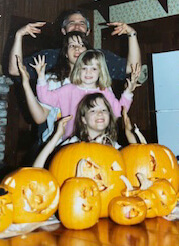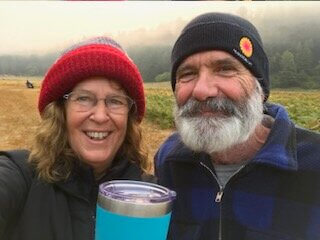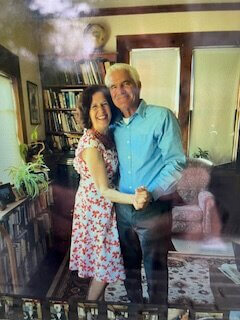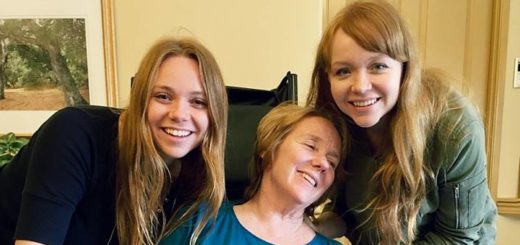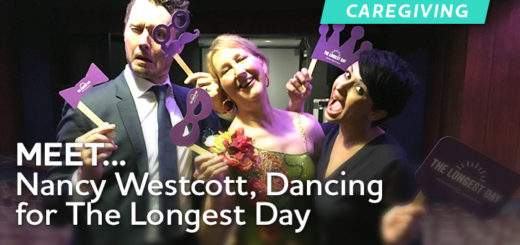Honoring her late husband: Eureka woman finds meaning as a Walk volunteer
By Kristine Kenefick, MSN, RN
Ronna Johnson and her husband, Greg, were married for 50 years. When Greg was diagnosed with Alzheimer’s disease, Ronna retired to be with him full-time. After he died, she found meaning in volunteering for the Alzheimer’s Association Walk to End Alzheimer’s® in her local community. Ronna shares how she and her daughters pulled together to care for Greg, and how she became inspired to join the Walk Committee.
High school sweethearts
Ronna Johnson and her husband Greg met in high school in Fort Bragg, and later raised their three daughters in Eureka. Greg was a creative man who loved gardening, woodworking, drawing and painting. He and Ronna became interested in astronomy when they were in college, and they would have “star parties” outside with their telescope. Camping trips, backpacking and time spent outdoors were all things that Greg enjoyed.
“He was an incredible life partner. Very loving, very adventurous, very resourceful, very kind,” said Ronna, “a man of integrity.” When he and Ronna bought an old house, Greg taught himself how to replace all of the plumbing and wiring. “He could fix anything,” said Ronna. “We actually called him MacGyver, because he was so resourceful in doing things.” Later in life, Greg and Ronna had many sailing adventures in the Puget Sound, aboard their 24-foot sailboat.
Noticing the early signs
When Ronna first saw some changes in Greg, she wondered if they could be due to normal aging and not some of the early signs of Alzheimer’s. Understandably, she didn’t want to believe that it could be something more serious.
Changes in mood and personality, and new problems with words in speaking or writing, are two early signs of Alzheimer’s. Greg started becoming impatient, which was new for him. “Where he used to be considerate and kind, he [became] brasher and [would say things] the old Greg would not have said,” said Ronna. “Then he started tripping over his words. It was insidious. It was so gradual in the beginning.”
Another one of the early signs can be decreased or poor judgement. Early on, Greg was still able to be home on his own. Ronna was alarmed one day when she found him working on an electrical outlet in their home in an unsafe way. It was at this point that Ronna decided to retire so she could be home with Greg full-time. “I [needed] to be there to care for my husband who cared for me and our daughters and [lived] a selfless life for us,” said Ronna.
Diagnosis
An early diagnosis can improve the quality of care and quality of life for the person living with the disease. Additionally, it may reduce the financial and emotional impact of Alzheimer’s disease on the family. Greg, who had witnessed his father’s experience with younger-onset Alzheimer’s disease, was reluctant to speak with a doctor about his symptoms. Younger-onset (also known as early-onset) Alzheimer’s affects people younger than age 65. At this time, Greg was in his early 60s and roughly the same age as his father when he started having symptoms.
Ronna struggled with balancing a respect for Greg’s independence with ensuring he was getting the help he needed. “I felt like I was walking a tight rope for a long time,” said Ronna. She went with Greg to have a skin growth removed from his arm, and during the appointment she was able to privately share her concerns with the doctor. The doctor and Ronna worked together to help Greg through the process of getting diagnosed.
The family pulls together
When Greg was diagnosed with Alzheimer’s disease, his family rallied around him. Two of their three daughters lived in Tulsa, Oklahoma, and they moved back to Eureka. Their daughter who lived in San Francisco drove up frequently to help. “They said ‘Mom, you and Dad cannot go through this alone,’ and they uprooted their families, their careers, and they moved out here to be with us,” said Ronna.
Their daughters were always available, whether it was sitting with Greg so Ronna could leave the house, bringing groceries, or giving moral support. There were times when Greg didn’t want his daughters to help, but they took this in stride and always kept trying. “It’s all so inexplicable and they understood that,” Ronna said.
Ronna and her daughters were not alone in their experience caring for a loved one living with Alzheimer’s. According to the Alzheimer’s Association 2024 Alzheimer’s Disease Facts and Figures report, approximately two-thirds of dementia caregivers are women, and over one-third of dementia caregivers in the United States are daughters caring for a parent. Facts and Figures also reports that it is more common for wives to provide care for a husband than vice versa.
Honoring his wishes
Ronna wanted to honor Greg’s wishes as much as possible. “My goal was dignity and comfort [for him]. As long as I was able to take care of him, no matter what, he was going to stay home with me,” said Ronna. They visited an adult day center to see if it could be a helpful resource, but Ronna followed Greg’s lead when he did not want to go back again.
At one point, Greg was prescribed one of the three U.S. Food and Drug Administration (FDA)-approved treatments that may help lessen symptoms of Alzheimer’s disease. However, he experienced side effects and did not want to continue taking the medication. “I thought, well, however long I have him, I’m gonna let him call the shots,” said Ronna. “If he’s feeling sick to his stomach, that’s [not a] good quality of life.”
Finding Walk
Shortly after Ronna retired, Greg’s condition quickly became worse. “[During] COVID-19 and isolation and not getting out…[things] escalated pretty quickly,” said Ronna. She learned about the Walk to End Alzheimer’s – Humboldt County, so she and Greg decided to attend the event together. They were only able to stay for the ceremony, but Ronna was still inspired by the event. “The ceremony was very moving,” said Ronna. “The fact that we’re raising money for a global cause [that reaches] all of us in one way or another, whether you lose a loved one or you know somebody [with the disease].”
The Walk to End Alzheimer’s is held annually in more than 600 communities nationwide. It is the world’s largest event to raise awareness and funds for Alzheimer’s care, support and research. This year’s Walk to End Alzheimer’s – Humboldt County is happening on Saturday, October 19, 2024.
Joining the Walk Committee
Greg died in 2023, at the age of 67. After his death, Ronna knew she wanted to volunteer for Walk. She started out by helping to set up for the event, and the experience was so positive that she decided to join the Walk Committee. “I needed a focus to help me through my grief, and I wanted it to be meaningful,” said Ronna. “I was drawn to working for a really good purpose that I had a special personal connection with.”
Ronna has found comfort and meaning in volunteering. “I think there’s something incredibly moving…when you get a lot of people together for a good cause for other people,” she said. “This is a way to channel what I am working through, and it has really helped me…I think the door swings both ways because yes, I’m doing something for other people, but they’re doing something for me, too.”
Ronna encourages others to consider volunteering. “It’s comforting. It’s a way to channel your grief. It’s a way to make a difference. It won’t bring back your loved one, but it can help you, and it can certainly help other people.”
Advice for others
Ronna was familiar with the needs of people living with Alzheimer’s from her 30 years of experience working as a nurse in a hospital. She also spent time reading about the disease online when she was caring for Greg. However, she wasn’t aware of all the resources available to help with caregiver stress and general support.
Looking back, she says “If I had known about the local branch, I probably would have tried to get some help.” Ronna advises other caregivers to seek help and prioritize self-care. “Be very kind to yourself. Take care of yourself. Seek help. Seek resources,” said Ronna. “You are human. You are a finite resource and you are there for the person who is changing before your eyes.”
You can join Ronna’s team, Greg’s Girls or start your own for Walk to End Alzheimer’s – Humboldt County on October 19, 2024. Not in Humboldt County? Visit alz.org/walk to find a Walk near you.
For more information on caregiver resources visit alz.org/caregiver or call our 24/7 Helpline at 800.272.3900. The Helpline is a free service offering support for people living with dementia, caregivers, families and the public. Connect with a live person who can provide information, local resources, crisis assistance and emotional support.






